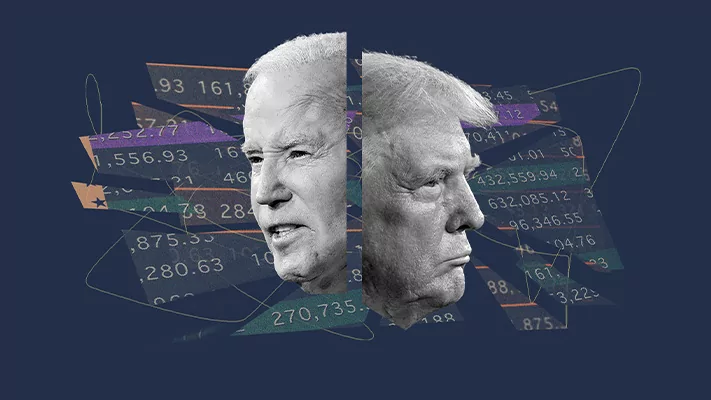The first 2024 presidential debate generated days of headlines about President Joe Biden‘s health and former President Donald Trump‘s loose way with words.
But the debate came just days after a government agency announced that $1.9 trillion would be added to the national debt this year alone — and that the ratio of debt to gross domestic product would soon eclipse a record set during World War II, suggesting there were more important matters to discuss than which candidate had a lower golf handicap.

“With debt growing out of control, we need leadership now more than ever. This should be domestic issue No. 1 in the presidential campaign,” said Maya MacGuineas, president of the Committee for a Responsible Federal Budget. “It’s time for Presidents Biden and Trump to put forward plans to fix our debt. And it’s long past time for Congress to act.”
The Congressional Budget Office’s debt update came just nine days before the presidential debate, yet MacGuineas’s plea for the candidates to make it the top domestic issue was not heeded. Both Biden and Trump mentioned it, but only as a means with which to attack each other.
“[Trump] had the largest tax cut in American history, $2 trillion,” Biden said at one point. “He raised the deficit larger than any president has in any one term.”
Trump promised his proposed tariffs would “reduce our deficit tremendously” while claiming that his 2017 tax cuts increased federal revenues because they “spurred the greatest economy that we’ve ever seen.”
“We took in more revenue with much less tax, and companies were bringing back trillions of dollars back into our country,” Trump said.
Biden then accused Trump of wanting to “fundamentally bankrupt the country” with another tax cut if reelected.
The problem for Biden, and for campaigning around the deficit generally, is that voters are inherently more interested in how much they pay in taxes than in esoteric concepts such as the national debt. Accordingly, Biden and Trump grew much more animated while speaking about immigration and abortion than how they would cut the deficit.
“Most presidents have just paid [the national debt] lip service,” presidential historian Craig Shirley said. “I don’t recall voters ever being concerned about the debt or deficit spending.”
Shirley has written more than half a dozen books on President Ronald Reagan, who significantly increased the national debt while becoming one of the most beloved presidents in living memory. He won 49 states in a historic landslide during the 1984 election, and his vice president was elected to the top job four years later.
Still, the numbers released in June aren’t pretty, and the public will begin to feel the pain at some point.
The national debt grew by $3.1 trillion in 2020 thanks to a host of COVID-19 stimulus programs and has been creeping back toward that number in the years since. It grew by $1.4 trillion in 2022 and $1.7 trillion in 2023, and it is set to grow by an estimated $1.9 trillion in 2024.
Biden has nonetheless used the $3.1 trillion figure from 2020 to claim he “cut the deficit,” a statement that is true only in the sense that the year-over-year deficit is not as high as it was in Trump’s last year in office. Trump’s largest non-COVID-19 deficit was $980 billion.
The national debt could reach 106.2% of GDP by 2027, surpassing the prior record set just after the end of World War II, and could reach 122% of GDP within a decade.
Interest payments alone will cost 3.1% of GDP this year and are expected to hit a record 4.1% next year, outpacing the amount spent on defense and Medicare. Those interest payments could eventually slow economic growth and threaten the status of popular government programs in a budget crunch.
Biden is right that Trump added more to the deficit than any other president, clocking in at $8 trillion over his four years. Absent COVID-19-related spending, the two are virtually tied at around $4.8 trillion each.
Trump campaign spokeswoman Karoline Leavitt criticized Biden’s handling of the budget in a statement sent to the Washington Examiner.
“President Trump built the strongest economy in American history,” she said. “In just three years, Joe Biden’s out-of-control spending created the worst inflation crisis in generations. President Trump proudly passed the largest tax CUTS in history. Joe Biden wants the largest tax HIKE ever, which would take nearly $40,000 away from the average American family who is already losing thousands every year due to Biden’s record-high inflation crisis.”
Conversely, the White House pointed to some of Biden’s efforts to reduce the deficit.
“After the prior administration increased the debt by a record $8 trillion and didn’t sign a single law to reduce the deficit, President Biden has signed $1 trillion of deficit reduction into law,” the Biden White House said in a statement. “While congressional Republicans want to blow up the debt again with $5 trillion in more Trump tax cuts, President Biden’s budget would lower the deficit by $3 trillion by making billionaires and biggest corporations pay their fair share and cutting spending on special interests.”
But the issue is unlikely to figure much in Democratic campaign messaging for the rest of this year. A handful of GOP opponents tried to hang deficit spending on Trump during the Republican primary and came away with nothing to show for it.
Polls bear out the issue as well, with deficit spending far from the top of mind for the average voter. A recent Gallup poll that asked voters what they think is the most important problem facing the country found that 36% cited economic problems, but just 5% named the federal budget deficit or federal debt as their top issue.
CLICK HERE TO READ MORE FROM THE WASHINGTON EXAMINER
David Greenberg, a Rutgers University history, media studies, and journalism professor, said the national debt has been a big issue in some presidential contests but is not one this time. The last candidates to take it seriously were Ross Perot and Bill Clinton, the latter of whom was able to balance the annual budget three times at the end of his second term.
“The debt has since then come to be seen as an elitist concern, more important to bankers than to ordinary people,” he said. “Both parties use it opportunistically to attack the other, but it’s not a huge winner with the public.”























